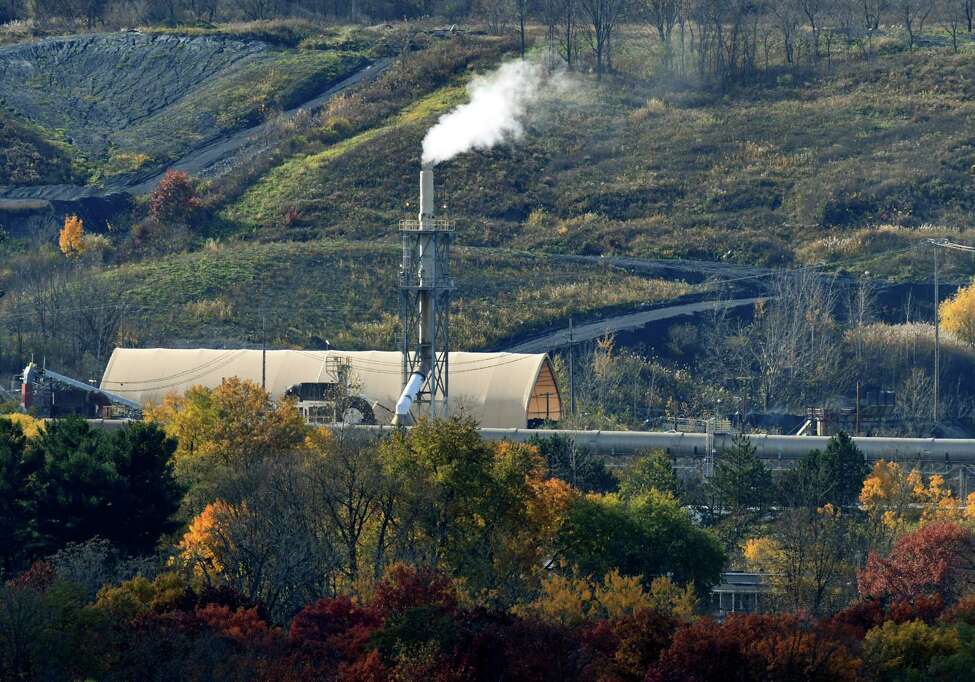The chemicals have been burned at the plant under a 2019 U.S. Department of Defense contract to incinerate firefighting foam containing PFOA and PFOS that have been stored at military installations throughout the northeast, and are now being disposed of due to the health risks.
PFOA and PFOS are so-called perfluoroalkyl and polyfluoroalkyl substances that have been known to cause serious health effects in people exposed to the chemicals through their water supplies. The DOD has been trying to burn the substances lately instead of storing them on military bases.
The regional contract was awarded to a company called Tradebe that owns the Norlite plant, which burns hazardous waste in a kiln for fuel to manufacture the construction materials it makes from a nearby quarry.
“The Norlite kiln also has a long history of environmental violations, resulting in fines and enforcement actions by the New York State Department of Environmental Conservation,” the plaintiffs, including the Sierra Club, wrote in a lawsuit filed Thursday in federal court in California. “The kiln is also located next to a public housing complex (the Saratoga Sites apartments on Cohoes Road), whose residents are exposed to emissions from the kiln.
Officials with Tradebe could not immediately be reached for comment.
The Sierra Club and other plaintiffs held a conference call Thursday to discuss the lawsuit. They allege Norlite has burned the firefighting foam and stored it in Cohoes, but is currently not burning it now as it upgrades the kiln’s scrubbers.
There have been 40 DOD shipments of the foam to Norlite in Cohoes from Feb. 7, 2019 until Sept. 6, 2019, according to those who held Thursday’s conference call, although it is unconfirmed how much of that has been burned in Cohoes so far.
Judith Enck, the former regional administrator for the Environmental Protection Agency, said during the press call that Norlite did not alert the state or local governments about the burning plan.
“Norlite has to come clean and inform the public of what they are doing and what they plan to do,” Enck said. “How can this happen without a comprehensive environmental review?”
Enck and others said the worry is that the toxic chemicals will be deposited into the Troy water reservoir that serves large parts of the region and is supposed to serve Hoosick Falls, which has been struggling with its own PFOA contamination crisis and is seeking a new water supply.
The EPA says PFOA and PFOS cause “adverse health effects” when it is in water supplies, including cancer, liver damage and thyroid effects, although there is less research on the impact when it is inhaled or touches the skin. Enck, however, said people who live near the plant should be concerned about inhaling the emissions since PFOA and PFOS don’t break down during burning.
“These chemicals resist incineration and do not break down under temperatures and conditions that are sufficient to destroy other chemicals,” Enck said. “Those properties are precisely why (they) are widely used as a fire suppressant. Incomplete incineration may result in (emissions of) other toxic chemicals like hydrogen fluoride, which is poisonous, corrosive and flammable.”
Enck said that Tradebe has a five-year, $2.2 million contract with the Defense Department to burn the firefighting foam, although she said that contract may include other sites beyond the Cohoes plant.
“Norlite makes a lot of money accepting this toxic material to be burned,” Enck said. “But money is not the only thing that matters. Norlite must publicly disclose what they have been doing in Cohoes and publicly pledge that they will not burn any more (PFOA and PFOS) at their incinerator. It is most unfortunate that they have already burned this material in Cohoes especially without telling anyone. We cannot accept this toxic material being burned at Norlite for the next five years.”
Enck is calling on the Cuomo administration to ban the burning of PFOA and PFOS, which she said causes cancer and fertility problems.
Assemblyman John McDonald III, who represents Cohoes, called the issues raised by the lawsuit “concerning” and he wants an immediate response by the state Department of Environmental Conservation to investigate.
“The fact that the Department of Defense awarded a contract for this method of disposal in the absence of validation in regards to public safety or health by the EPA is even more troubling,” McDonald said. “There are many unknowns with this method of disposal.”
DEC spokeswoman Erica Ringewald issued a statement Thursday that said the agency “is committed to robust oversight of operations” at the Norlite facility.
Currently, she explained that DEC is working with EPA’s Office of Research and Development and Norlite to design and implement a stack test that would provide important information about “whether or not incineration can be effectively used to destroy these compounds.”
Cohoes Mayor Bill Keeler says he has also scheduled meetings with officials from Tradebe, the owner of the Norlite facility, for next Tuesday. He has also reached out to state and federal elected officials for support.
“I am working to determine whether all necessary steps are being taken to protect the health and safety of our residents in the vicinity, and of our first responders should they be called to the Norlite facility,” Keeler said in a statement. “My utmost concern is for the immediate and long-term health and safety of the people of Cohoes and the surrounding area potentially affected. These are very important questions for which we need very clear answers. No incineration of firefighting foam… should be permitted at the Norlite facility until we are absolutely certain that there is no danger to the public or the environment.”
*Original article online at https://www.timesunion.com/business/article/Norlite-plant-in-Cohoes-burned-PFOA-for-Defense-15070794.php



